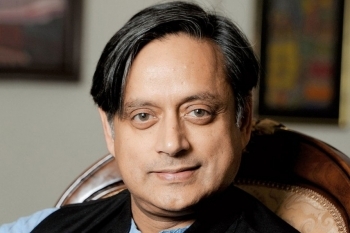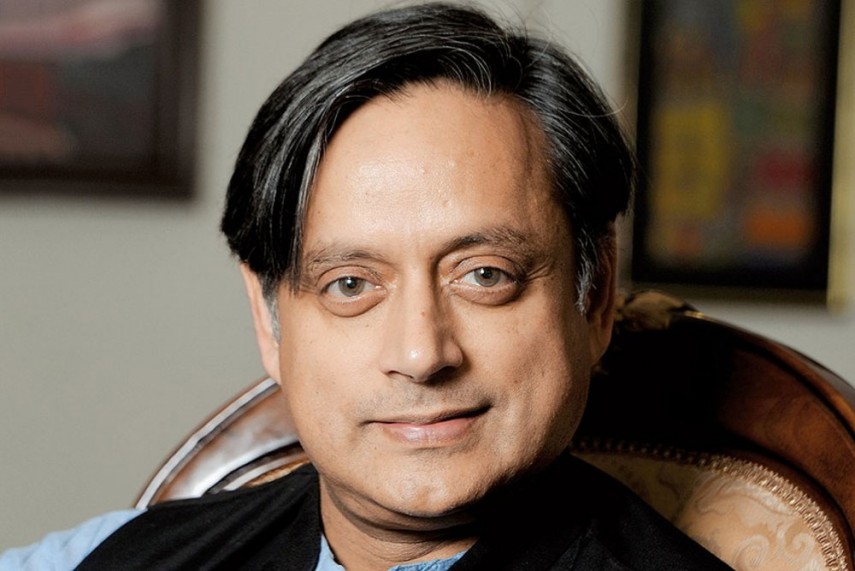
.png) Manoj Varghese
Manoj Varghese

India is in a dilemma to sustain the old friendship with Russia or to stand with the new Quad friends of USA, Japan and Australia in the ongoing war-like situation in Ukraine. On one hand is the grand old Russia invading a country and on the other side is Ukraine as a victim. With the Russian nuclear alert, every eye is on USA with an escalated fear of world war-like situation. Shashi Tharoor, former Under-Secretary General of the United Nations and popularly known as diplomat, politician, writer, intellectual and Member of Parliament, shared his views on the Russia-Ukraine conflict with Manoj Varghese of Indian Currents.
Q. What are the major challenges or threat or benefit for India emerging from this Russia-Ukraine war?
A. There is no one going to be benefitted out of this war. Well, Russia perhaps may know as to what will it benefit. As far as the world is concerned, India is no exception. It will have damaging short-term consequences along with the countries concerned on economy, with the price rise on petrol, gas, oil, trades and commodities. Yesterday the petrol price was reported to be $114 per barrel, whereas all our calculations for the recent budget was made on the assumption of $75, so almost a rise of $40 per barrel will affect our budget. Hence, the budget goes for a toss. This will lead to inflation as well as rising price and economically we are going to suffer. We all have geo-political concerns too, for example now the US refocuses on Russia and Europe rather than East Asia pacific.
Q. What prompted India to abstain from voting in the UN Security Council on the Russian attack?
A. It is evident that India has compulsions linked to two mutual factors; one is the long-standing relations with Russia going back to the days of Soviet Union. Moscow was very supportive and saved India on the Kashmir issue in UN. It was the Soviet Union which vetoed the anti-India resolutions in the UN during the Bangladesh liberation in 1971. Historically there has been a lot of mutual respect among both the countries. Second factor is our heavy military dependency on Russia. And the desire not to completely abandon the Russians to the Chinese impinge. All these aspects come to hold unique relationship with Russia for continuous military supply of almost 50% aircraft and services.
Q. Has abstaining from voting and going along with China sent across a wrong signal to the world community on India?
A. As far as I am concerned, it is not so much the abstention, but the failure to reiterate on principles, that have always mattered to India. That is the inviolability of borders, sovereignty of states and the inadmissibility of using the security force to settle international disputes. Unfortunately, all of these have been violated by the Russians and we remained silent, which was bit of a shock.
Q. Do you see any nuclear threat in the offing?
A. No, not at all. There has been a gesture of placing the nuclear forces on high alert. But I would take that purely at this stage as pressure tactics and no one expects a nuclear war. Especially when the conflict is between the two countries where only one is a nuclear power, I think it is simply a message that Russians are trying to send to big nations that they don’t get involved.
Q. Does the stand endorse Nehru’s foreign policy of friendship with Russia?
A. It has nothing to do with Nehru at all. This is a BJP problem of linking everything to Nehru. In fact, all our developments are attributed after Nehru’s time. Essentially, what we are looking at is, has the Govt made calculations of what is India’s interest at the present time and that is what matters. Broadly it is true to say that we continue with the foreign policy of 1947 and the practice of blaming the past governments need to stop. The national interest must prevail and should not change from party to party.
Q. The action of USA and European countries is limited to the sanctions against Russia. Why did they not extend full-fledged physical support to Ukraine?
A. European nations have been offering humanitarian assistance and relief including food supplies and blankets. Even India has been providing the relief measures. Some European nations have given cash and some weapons. But they are not going to send soldiers as Ukraine is not a member of NATO or any such alliance. Had they been a member country, the NATO soldiers would have been bound by the treaty to go there. The military defence has to be done by Ukraine itself. I don’t think other countries will get directly involved in the warfare other than supplying the relief or weapons, unless Ukraine asks for.
Q. Are the evacuation efforts of India enough considering the huge number of over 20k Indians stranded in Ukraine?
A. I think it seems to have gathered speed and effectiveness. Today we were assured by the Foreign Minister that there would be sufficient reboots on the ground. A good number of leaders are already on the borders to expedite the evacuation. Tragically, two Indians have died, and we don’t want to lose any more lives. We stand with the Government on this aspect to make their best efforts to happen that.
Q. Over 17k Indian students go to Ukraine for medical education. Recently, the PM said, we need to encourage the private sector and open up more medical opportunities in our country. How do you see the present scenario, is it a challenge or an opportunity?
A. I don’t know why the realization is happening now. I have been raising this issue before I came into politics in 2006. We have created an artificial scarcity of medical seats in India. The monopoly and practices of vested interests won’t let colleges expand and set the regulations so tight that even the existing colleges have no provisions to increase the seats at their end. As a result, we have created a difficult situation to procure a medical seat, unless they are in a top rank or can afford to pay. Thus, it is hampering the quality of medical education. I am sorry to say that in our country with the capitation fees in practice, we have a serious problem in terms of possibilities available. This scarcity is the root cause of these problems.
Q. What is our stand on Russia recognizing Donetsk and Luhansk regions of Ukraine as independent nations?
A. We are respectful of the sovereignty of Ukraine and we are not doing anything about it. Only Russia has recognized that.
Q. What about the status of other neighbouring countries like Romania, Hungry, Poland and others? Will they take sides?
A. They are directly involved in the sense that even our Indian students are being evacuated with the help of these countries. Beyond that, I don’t expect any other involvement now.
Q. What was the crux of Union Foreign Minister’s briefing today?
A. The Foreign Minister had called for a special All-party meeting today to abreast us with the latest happenings and the Indian stand on the developments in Ukraine. I think at this point of time our main concern, which was also reflected in the majority of our discussions too, was about the experience of Indian strategy on Ukraine, the evacuation exercise, stimulus effectiveness and remaining challenges. And on these issues, we all are united and intend to bring our children safely back to India.